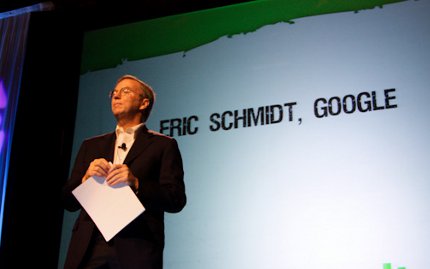As TechCrunch's Disrupt conference continues, more industry heavyweights are taking to the stage to discuss the fortunes of their companies. The latest speaker is Google CEO Eric Schmidt, who took the chance to talk broadly about Google and the future of the tech industry in general.
Serendipity
Of course, the company's primary business is still search, and Schmidt had plenty to say on the topic. He told attendees that the company was focused on saving time and that the recently rolled out Google Instant was the first step along this path. Though the new service may only save a second or two per search, the difference is huge when aggregated across all of Google's users.
The next step would be to integrate 'personal' and 'social circle' results, which is expected to go live later this year. If an individual gives the search-engine permission, personal context, e-mails and other data will be used to help generate more accurate and appropriate results.

The final evolution was what Schmidt described as a "serendipity engine". The basic idea is that search results are constantly being generated in the background based on what a user is doing on any one of their devices - including smartphones, which are expected to play an even more important role in the company's future.
Defining the generation
Expanding on this, the CEO called the smartphone "the defining and iconic device of our time". In the future, he expected the devices to become more capable and continue to make our lives easier, resulting in a constantly connected society where "if you're awake, you're probably online". However, Google is still working on a way to efficiently monetise mobile search - a challenge that is holding the company's revenue back in the portable space.
Talking of making money, Schmidt was asked about his thoughts on Twitter. While he declined to comment on the possibility of Google buying the micro-blogging site, he expressed confidence that it could become very profitable with the right "advertising and monetization products".
Of course, the CEO also took the opportunity to take some shots at the competition. When asked about the company's policy of openness, he responded with a comparison to Apple. While he acknowledged that the iPod-maker's business model was extremely successful, he commented that being forced to use the company's hardware, platform and development tools "would not be open. The inverse would be open". Conversely, he suggested that "Google's core strategy is openness" and that the company wanted to "let the user decide".













